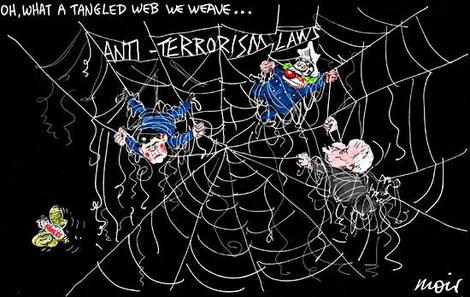Search
Democracy Links
Member's Off-site Blogs
be afraid, be very afraid .....

‘The Howard Government repeatedly defended its anti-terror laws during the 25 days it detained Mohamed Haneef.
Attorney-General Philip Ruddock, for example, said: "The system is working as intended." In fact, key parts of the law did not operate as intended and, to the extent that they did, this only strengthens the case for reform.
When the law was passed in 2004, I argued before a Senate committee for a maximum of two days detention without charge. This was to overcome the possibility of significant periods of dead time causing an over-lengthy detention. The Attorney-General's Department rejected this, with a senior official saying: "I would be extraordinarily surprised if the dead time, for example, in relation to the time zones, would get anything like the sorts of time periods that were being suggested by Professor Williams."
Of course, Haneef was detained for 12 days, not two.
Concerns about the law led then justice minister Chris Ellison to promise in parliament: "Should the Senate pass this updated dead time mechanism, I make the undertaking that the Government will conduct an independent review of the new investigatory framework for terrorism investigations approximately three years after they become law. Such a review would provide an opportunity to exhaustively analyse the operation of the new provisions and remedy any evident operational or legal shortcomings."
Both operational and legal shortcomings are apparent, yet we have not seen the promised review. It was due on June 30.’
elsewhere …..
‘Haneef was first subjected to the sharp edge of Australia's so-called anti-terror legislation: every tool available to the authorities was used short of physical torture. All that has been shown is that these powers in the hands of faceless investigators and bureaucrats should make us all shudder both in fear and in embarrassment.
Minister Andrews' decision to revoke Haneef's visa was unashamedly intended to usurp the criminal process by moving the power to detain him, before he is convicted, from the court system to the executive government. The fact that he relied upon faulty information emphasises the dangers when there is not independent judicial assessment of information relied upon by police. Add to that the overstatement of these assertions by the government's prosecutor and we have the recipe for tragedy.
Removing such important decisions about our freedoms and liberties to political frameworks means that the truth is apt to be clouded by dust and spin. This has the practical effect of greatly diminishing the power to review the government's actions and removing obligations of disclosure.
The application of these laws in the fashion exercised against Haneef has not made many of us feel safer and there is no real likelihood that we are in fact any safer. Yet these laws abridge the rights of all of us by demonising an individual by mere allegation.
These laws do not protect Australians. They look unlikely to increase the possibilities of catching terrorists and their associates. Yet they diminish and shame us and lay bare our pretensions of sophistication and maturity as a nation that heralds the "fair go".
The brutal demonstration of executive power against this young doctor signals a cold warning about how dangerous unchecked political power can become. Big Brother is not just a boring reality TV show. Even Orwell would be grimacing.
Be afraid, be very afraid.’
The Pursuit Of Terrorists Post September 11: Be Afraid, Be Very Afraid …
- By John Richardson at 6 Aug 2007 - 9:04pm
- John Richardson's blog
- Login or register to post comments
Recent comments
40 min 37 sec ago
2 hours 15 min ago
2 hours 57 min ago
3 hours 23 min ago
3 hours 30 min ago
4 hours 57 min ago
5 hours 9 min ago
5 hours 15 min ago
10 hours 12 min ago
10 hours 49 min ago